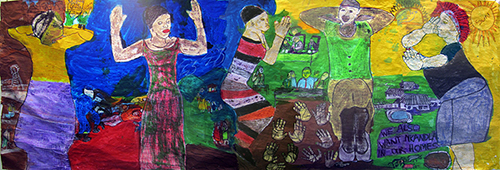Latest News Archive
Please select Category, Year, and then Month to display items
30 October 2018
|
Story Rulanzen Martin
|
Photo Peet van Aardt
 Some of the student writers who contributed to the anthology that tells their stories in Sesotho, isiXhosa, isiZulu, English and Afrikaans.
Some of the student writers who contributed to the anthology that tells their stories in Sesotho, isiXhosa, isiZulu, English and Afrikaans.
How do you transform the higher education curriculum? You involve the exact people the curriculum is intended for. The book, Initiative for Creative African Narratives (iCAN,) illustrates how decolonisation can be achieved through literature for students by students.
iCAN is an initiative by the Centre for Teaching and Learning (CTL) at the University of the Free State (UFS) to mentor students in creative and narrative writing. Under the mentorship of Dr Peet van Aardt, project coordinator, and Ace Moloi, author and UFS alumnus, iCAN Volume 1 was recently launched with 47 short stories written by UFS students.
“The project is a response from the centre for the ever-increasing need for decolonised curricula, steeped in the local cultural perspective of ubuntu,” said Dr Van Aardt.
“This book is an example for how decolonisation can be implemented,” said Prof Francois Stydrom, Senior Director of CTL. The overall aim of the iCAN project is to have the content that materialised from it to be included in the curriculum of first-year students at UFS in the near future.
Book provides multiple voices
Starting in May 2018, CTL presented a series of creative writing workshops on all three of the UFS campuses. “It’s a medium that allows a diverse range of students to express their views and develop their voices as writers,” said Prof Strydom.
It is a form of empowerment, to pass the baton to students to improve the UFS curriculum by writing and publishing their own stories, thereby contributing to larger bodies of knowledge through their lived experiences.
“I believe we as a university need to enable students so that they move away from just being users to becoming contributors to the curriculum,” Dr van Aardt concluded.
Panel to discuss: 'Speaking wounds: voices of Marikana widows through art and narrative' on Monday 27 July 2015
2015-07-24
The massacre of 34 mine workers at Marikana on 16 August 2012 had South Africans in uproar. But what remained, after the razor wire was rolled up and the camera crews left, were 34 widows engulfed in silent despair. That was until the Khulumani Support Group introduced them to the transformative power of art and storytelling. In the last installment of the Vice-Chancellor’s Lecture Series for this year, a panel of speakers will discuss these widows’ journey with the theme of ‘Speaking wounds: voices of Marikana widows through art and narrative’.
Panel
The panel will consist of members from the Khulumani Support Group that include Dr Marjorie Jobson (National Director), Nomarussia Bonase (National Organiser), and Judy Seidman (Sociologist and Graphic Artist). Nomfundo Walaza, who is the former CEO of the Desmond Tutu Peace Centre, will be the respondent.
Details of the event:
Date: Monday 27 July 2015
Time: 12:00
Venue: Chancellor's Room, Centenary Complex, Bloemfontein Campus
RSVP: Nomusa Mthethwa at Nomusam@ufs.ac.za (Members of the public are welcome to attend.)
Body maps
An art exhibition consisting of body maps created by the widows will also be on display. These paintings quietly portray the turmoil of their inner landscapes, their perceptions of the massacre, and the impact these events had on their lives.

Collaboration
The lecture series is hosted by Prof Pumla Gobodo-Madikizela, Senior Research Professor in Trauma, Forgiveness, and Reconciliation Studies at the University of the Free State (UFS), as part of a five-year research project funded by the Andrew W. Mellon Foundation. This installment of the lecture series is presented in collaboration with the UFS Institute for Reconciliation and Social Justice.